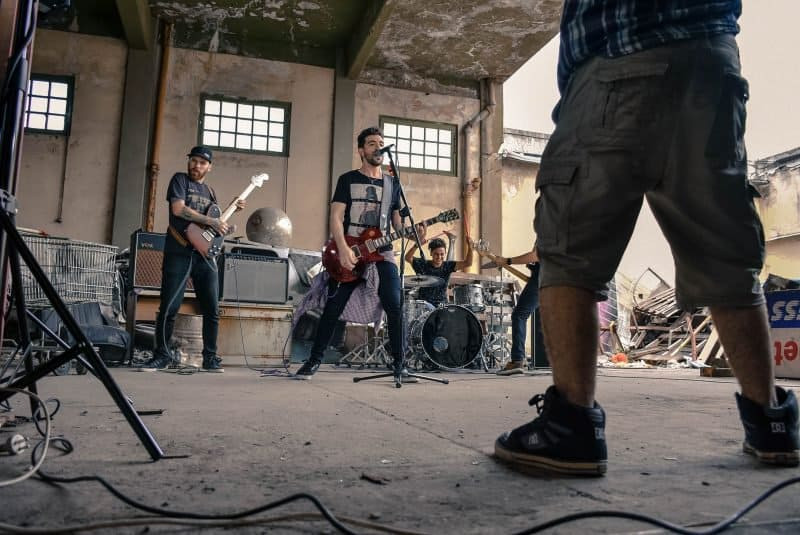Forming a rock band might seem daunting, but it’s entirely achievable with the right steps. At rockscapes.net, we guide you through this exciting journey, focusing on everything from finding the right musicians to securing gigs. Dive in to discover how to craft your rock ‘n’ roll dream, create stunning rockscapes in your backyard, and transform your space into a haven of beauty and tranquility.
1. Assembling Your Rock Band
Is gathering the right people the first step in How To Form A Rock Band? Yes, finding the right bandmates is crucial as they will be your creative partners. Traditionally, a rock band includes a drummer, guitarist, bassist, and vocalist, but modern bands often incorporate diverse instruments like keyboards, synthesizers, and horns. According to research from Arizona State University’s School of Music in July 2023, diverse instrumentation can lead to unique and innovative soundscapes.
-
Identify the Needed Roles: Begin by determining the essential roles for your band based on your desired sound. Do you need a powerhouse drummer, a shredding guitarist, or a charismatic lead singer?
-
Reach Out to Your Network: Start by asking friends and acquaintances if they play any instruments or know anyone who does. Word-of-mouth is an effective way to find potential bandmates.
-
Post Flyers and Online Ads: Create eye-catching posters and post them in local music stores, community centers, and online forums. Include details about your band’s style, influences, and what you’re looking for in a musician.
-
Utilize Social Media: Leverage platforms like Facebook, Twitter, and Instagram to spread the word. Join local music groups and share your band’s vision.
-
Attend Local Jam Sessions: Participate in jam sessions and open mic nights to meet other musicians and assess their talent and compatibility.
-
Hold Auditions: Once you have a pool of potential bandmates, hold auditions to evaluate their skills and see how well they fit with your band’s dynamic.
-
Assess Chemistry and Compatibility: Talent is important, but chemistry is essential. Make sure you get along well with your bandmates, as you’ll be spending a lot of time together.
-
Prioritize Commitment and Passion: Look for musicians who are passionate about music and committed to the band’s success. Dedication is key to overcoming challenges and achieving your goals.
-
Define Roles and Responsibilities: Clearly define each member’s role and responsibilities within the band. This will help avoid conflicts and ensure everyone is on the same page.
-
Set Clear Expectations: Discuss expectations regarding practice schedules, gigs, songwriting, and financial contributions. Open communication is vital for maintaining a healthy band dynamic.
 Rock band members collaborating on songwriting in a rehearsal space, showcasing teamwork and creativity
Rock band members collaborating on songwriting in a rehearsal space, showcasing teamwork and creativity
2. Defining Your Rock Sound
How do you define your rock band’s sound? Defining your sound is about finding the unique blend of influences and styles that resonate with all members. At your first band meeting, discuss your favorite artists, genres, and musical influences. Your sound will likely emerge from these shared interests.
-
Identify Your Influences: Begin by identifying the artists and genres that inspire you individually. This will help you understand your musical tastes and preferences.
-
Share and Discuss Your Influences: Share your influences with your bandmates and discuss what aspects of those artists and genres you find appealing.
-
Explore Common Ground: Look for common ground among your influences. Are there any artists or genres that everyone in the band enjoys? This can serve as a foundation for your band’s sound.
-
Experiment with Different Styles: Don’t be afraid to experiment with different styles and genres. Try blending elements from various influences to create something unique and original.
-
Consider Your Vocalist’s Strengths: Your vocalist’s range and style will significantly impact your band’s sound. Choose genres and songs that suit their vocal abilities.
-
Incorporate Each Member’s Strengths: Identify each member’s strengths and incorporate them into your band’s sound. This will help create a well-rounded and dynamic musical experience.
-
Develop Original Material: Once you have a clear understanding of your influences and strengths, start developing original material that reflects your band’s unique identity.
-
Seek Feedback and Refine: Share your original material with trusted sources and seek feedback. Use this feedback to refine your sound and improve your songwriting skills.
-
Embrace Your Individuality: Don’t be afraid to embrace your individuality and create a sound that is authentic to your band. Your unique perspective is what will set you apart from other artists.
-
Stay Open to Evolution: As your band evolves, your sound may also evolve. Stay open to new influences and ideas, and allow your sound to grow and develop organically.
 Musician passionately playing an electric guitar, capturing the essence of rock music and artistic expression
Musician passionately playing an electric guitar, capturing the essence of rock music and artistic expression
3. Finding a Rock Rehearsal Space
What are the ideal rehearsal spaces for a rock band? Finding the right rehearsal space involves balancing practicality with affordability. Options range from basements and garages to professional rehearsal studios and storage units. Ensure the space doesn’t lead to noise complaints or legal issues, and consider soundproofing if necessary.
-
Evaluate Your Needs: Before you start searching for a rehearsal space, evaluate your band’s needs in terms of size, equipment, and noise level.
-
Consider Your Budget: Determine how much you’re willing to spend on a rehearsal space each month. This will help narrow down your options.
-
Explore Different Options: Consider a variety of options, including basements, garages, community centers, storage units, and professional rehearsal studios.
-
Prioritize Accessibility: Choose a location that is easily accessible for all band members. Consider factors such as parking, public transportation, and proximity to each member’s home.
-
Address Soundproofing Concerns: If your rehearsal space is located in a residential area, address soundproofing concerns to avoid noise complaints.
-
Inspect the Space: Before committing to a rehearsal space, inspect it thoroughly to ensure it meets your needs. Check for adequate lighting, ventilation, and electrical outlets.
-
Negotiate Rental Terms: Once you’ve found a suitable rehearsal space, negotiate rental terms with the landlord or property manager.
-
Create a Comfortable Environment: Make the rehearsal space feel like a second home by adding personal touches and creating a comfortable environment.
-
Maintain the Space: Keep the rehearsal space clean and organized to ensure it remains a productive and enjoyable environment for all band members.
-
Respect Neighbors and Community: Be mindful of your neighbors and community by keeping noise levels reasonable and adhering to any noise ordinances.
 Image showcasing a band using a storage shed for practice, demonstrating resourcefulness and adaptability
Image showcasing a band using a storage shed for practice, demonstrating resourcefulness and adaptability
4. Songwriting Essentials for Your Rock Band
How do you write songs for a rock band? Writing songs is a creative process that can be both exciting and challenging. Start by learning a few covers to build cohesion. Then, dive into original compositions, using songwriting prompts to spark ideas. Aim for at least twelve songs to headline a show, but prioritize quality over quantity.
-
Establish a Writing Process: Establish a clear and consistent writing process that works for all band members. This could involve brainstorming ideas together, writing lyrics individually, or composing music collaboratively.
-
Draw Inspiration from Personal Experiences: Draw inspiration from your own personal experiences, emotions, and observations. This will help you create authentic and relatable songs.
-
Experiment with Different Song Structures: Don’t be afraid to experiment with different song structures and arrangements. Try unconventional approaches to create unique and memorable songs.
-
Focus on Strong Hooks and Melodies: Focus on crafting strong hooks and melodies that will grab listeners’ attention and make them want to hear more.
-
Write Lyrics That Tell a Story: Write lyrics that tell a story or convey a message. Use vivid imagery and evocative language to paint a picture in the listener’s mind.
-
Incorporate Diverse Musical Elements: Incorporate diverse musical elements from different genres and styles. This will help create a dynamic and engaging listening experience.
-
Collaborate and Share Ideas: Collaborate with your bandmates and share ideas openly. This will help you create songs that reflect the collective vision of the band.
-
Seek Feedback and Refine: Share your songs with trusted sources and seek feedback. Use this feedback to refine your songwriting skills and improve your songs.
-
Protect Your Intellectual Property: Once you’ve written a song, protect your intellectual property by registering it with the appropriate copyright authorities.
-
Perform Your Songs Live: Perform your songs live to gauge audience reaction and refine your performance skills. This will help you connect with your fans and build a following.
 Acoustic guitar with a notebook, symbolizing the creative process of songwriting and musical expression
Acoustic guitar with a notebook, symbolizing the creative process of songwriting and musical expression
5. Brainstorming Your Rock Band Name
What makes a rock band name stand out? A memorable name is essential for branding. Gather your band members and brainstorm ideas. Consider names that are short, easy to spell, and appear readily in Google searches. Avoid names already trademarked or associated with established bands.
-
Brainstorm a List of Ideas: Start by brainstorming a list of potential band names. Encourage creativity and don’t be afraid to think outside the box.
-
Consider Your Band’s Style: Choose a name that reflects your band’s style and genre. A name that accurately represents your music will help attract the right audience.
-
Keep It Short and Memorable: Opt for a name that is short, catchy, and easy to remember. A name that is easy to recall will help with word-of-mouth promotion.
-
Check for Availability: Before settling on a name, check for availability on social media platforms, domain names, and trademark databases.
-
Get Feedback from Trusted Sources: Once you have a shortlist of potential names, get feedback from trusted sources such as friends, family, and fellow musicians.
-
Avoid Generic or Overused Names: Steer clear of generic or overused names that may blend in with the crowd. Choose a name that is unique and distinctive.
-
Consider the Meaning and Imagery: Think about the meaning and imagery associated with your chosen name. Does it evoke the right emotions and associations?
-
Ensure Pronounceability: Choose a name that is easy to pronounce and spell. A name that is difficult to say or spell may confuse potential fans.
-
Test It Out: Before making a final decision, test out your chosen name in different contexts. How does it sound when spoken aloud? How does it look in print?
-
Make It Official: Once you’ve settled on a name, make it official by registering it with the appropriate authorities and updating your social media profiles.
 Friends brainstorming together to come up with a band name, showcasing collaboration and creativity
Friends brainstorming together to come up with a band name, showcasing collaboration and creativity
6. Crafting a Rock Band Agreement
Why is a band agreement important for a rock band? A band agreement minimizes potential conflicts by outlining each member’s responsibilities, time commitment, and financial contributions. This ensures everyone is on the same page and helps resolve disputes amicably.
-
Define Roles and Responsibilities: Clearly define each member’s role and responsibilities within the band. This includes tasks such as songwriting, booking gigs, managing finances, and handling public relations.
-
Outline Financial Arrangements: Outline financial arrangements, including how income and expenses will be shared among band members.
-
Address Ownership of Intellectual Property: Address ownership of intellectual property, including songs, recordings, and band name.
-
Establish Decision-Making Processes: Establish decision-making processes for resolving disputes and making important decisions about the band’s future.
-
Set Rules for Membership Changes: Set rules for membership changes, including how new members will be added and how existing members can leave the band.
-
Include a Dispute Resolution Mechanism: Include a dispute resolution mechanism for resolving conflicts that may arise between band members.
-
Specify Time Commitment Expectations: Specify time commitment expectations for rehearsals, gigs, and other band-related activities.
-
Cover Insurance and Liability Issues: Cover insurance and liability issues, including who is responsible for covering any damages or injuries that may occur during band activities.
-
Regularly Review and Update: Regularly review and update the agreement to ensure it continues to meet the band’s needs and reflect any changes in circumstances.
-
Seek Legal Advice: Seek legal advice from an attorney experienced in entertainment law to ensure the agreement is legally sound and enforceable.
6.1. Time Commitment
What are the time commitments for a rock band? Agree on practice frequency, gig expectations, and individual responsibilities to avoid resentment and ensure everyone is aligned.
6.2. Band Responsibilities
How should responsibilities be divided in a rock band? Assign roles such as bandleader, rehearsal director, public relations manager, and bookkeeper to ensure all necessary tasks are covered.
6.3. Finances
How should finances be managed in a rock band? Establish a system for managing expenses, equipment costs, and income distribution. Clarify song ownership and publishing royalties to avoid future disputes.
![]() Image symbolizing a band contract, highlighting the importance of formal agreements in the music industry
Image symbolizing a band contract, highlighting the importance of formal agreements in the music industry
7. Recording a Rock Demo
Why is a demo important for a rock band? A demo is essential for showcasing your band’s sound to venue owners and promoters. Record a few songs and create a short mashup to grab their attention.
-
Choose the Right Songs: Select songs that showcase your band’s strengths and represent your unique sound.
-
Invest in Quality Equipment: Invest in quality recording equipment, including microphones, interfaces, and software.
-
Find a Suitable Recording Space: Find a suitable recording space that is quiet and acoustically treated.
-
Set Realistic Goals: Set realistic goals for the recording session and don’t try to do too much at once.
-
Stay Organized and Focused: Stay organized and focused during the recording session to maximize productivity.
-
Be Open to Experimentation: Be open to experimentation and try new things during the recording process.
-
Seek Feedback from Trusted Sources: Seek feedback from trusted sources and use it to improve your recordings.
-
Master Your Recordings: Master your recordings to ensure they sound their best on all playback devices.
-
Promote Your Demo: Promote your demo online and offline to reach potential fans and industry professionals.
-
Use Your Demo to Get Gigs: Use your demo to get gigs and build your band’s reputation.
 Cassette tape, representing the process of recording and distributing music in the rock era
Cassette tape, representing the process of recording and distributing music in the rock era
8. Defining Your Rock Band’s Look
Why is a band’s image important in rock music? Your look is a visual representation of your band’s identity. Ensure consistency in style and vibe to create a strong impression on your audience.
-
Reflect Your Band’s Style: Your look should reflect your band’s style and genre.
-
Create a Cohesive Image: Create a cohesive image that is visually appealing and memorable.
-
Be Authentic: Be authentic and true to yourself.
-
Consider Your Target Audience: Consider your target audience when choosing your look.
-
Pay Attention to Detail: Pay attention to detail, including clothing, accessories, and hair.
-
Experiment with Different Styles: Experiment with different styles until you find one that works for your band.
-
Seek Inspiration from Other Artists: Seek inspiration from other artists, but don’t copy their style.
-
Use Your Look to Tell a Story: Use your look to tell a story about your band.
-
Be Consistent: Be consistent with your look over time.
-
Evolve Your Look Over Time: Evolve your look over time as your band grows and changes.
 Band photo in a desert setting, showcasing the visual identity and aesthetic of a rock group
Band photo in a desert setting, showcasing the visual identity and aesthetic of a rock group
9. Finding Rock Gigs and Venues
How can a rock band find gigs? Finding gigs requires creating an Electronic Press Kit (EPK) and networking with venue owners. An EPK should include your music, band photos, bio, videos, and contact information.
-
Research Local Venues: Research local venues that host live music.
-
Create an EPK: Create an EPK that includes your band’s music, photos, bio, and contact information.
-
Network with Venue Owners: Network with venue owners and bookers.
-
Attend Local Shows: Attend local shows and support other bands.
-
Start Small and Build Up: Start small and build up to larger venues.
-
Be Professional and Reliable: Be professional and reliable when booking gigs.
-
Promote Your Shows: Promote your shows online and offline.
-
Provide High-Quality Performances: Provide high-quality performances that will keep audiences coming back for more.
-
Build Relationships with Fans: Build relationships with fans and create a loyal following.
-
Use Social Media to Connect: Use social media to connect with fans and promote your music.
 Music venues in Nashville, showcasing the vibrant live music scene and opportunities for rock bands
Music venues in Nashville, showcasing the vibrant live music scene and opportunities for rock bands
10. Promoting Your Rock Band
How can you promote your rock band effectively? Promoting your band is an all-hands-on-deck operation. Use posters, social media events, and word-of-mouth to maximize attendance at your shows.
-
Create a Website: Create a website for your band.
-
Use Social Media: Use social media to connect with fans.
-
Create a Mailing List: Create a mailing list to keep fans informed about upcoming shows.
-
Distribute Flyers and Posters: Distribute flyers and posters in your local community.
-
Contact Local Media Outlets: Contact local media outlets to get coverage for your band.
-
Partner with Other Businesses: Partner with other businesses to promote your band.
-
Offer Merchandise for Sale: Offer merchandise for sale at your shows.
-
Create Music Videos: Create music videos to showcase your band’s music.
-
Collaborate with Other Artists: Collaborate with other artists to reach new audiences.
-
Enter Music Competitions: Enter music competitions to gain exposure for your band.
 Music posters and flyers, representing the traditional methods of promoting rock bands and live performances
Music posters and flyers, representing the traditional methods of promoting rock bands and live performances
Bonus: Seeking Professional Assistance for Your Rock Band
When should you seek professional help for your rock band? As your band gains traction, consider bringing in professionals like managers, booking agents, and accountants to help with day-to-day tasks, gig bookings, and finances.
-
Identify Your Needs: Identify your band’s needs and determine what type of professional assistance you require.
-
Research Potential Candidates: Research potential candidates and look for professionals who have experience working with bands in your genre.
-
Check References: Check references and speak with other bands who have worked with the professionals you are considering.
-
Negotiate Contracts: Negotiate contracts that are fair and equitable for both parties.
-
Communicate Openly: Communicate openly and honestly with your professional team.
-
Set Clear Expectations: Set clear expectations for your professional team.
-
Trust Your Instincts: Trust your instincts when making decisions about your band’s career.
-
Stay Involved in Decision-Making: Stay involved in decision-making and don’t relinquish control of your band’s destiny.
-
Be Prepared to Invest: Be prepared to invest time and money in your band’s career.
-
Build Long-Term Relationships: Build long-term relationships with your professional team.
![]() Shaking hands during music deal
Shaking hands during music deal
FAQ About Forming a Rock Band
1. How Many Members Should a Rock Band Have?
The number of members in a rock band can vary, but typically, a standard rock band consists of four to five members: a vocalist, a guitarist, a bassist, and a drummer, but some bands may include keyboardists or other instrumentalists depending on their desired sound.
2. What Kind of Equipment Does a Rock Band Need?
A rock band typically requires essential equipment such as guitars, bass, drums, amplifiers, microphones, and a PA system, and the specific equipment may vary depending on the band’s style and preferences.
3. How Important Is It for Band Members to Get Along?
It is crucial for band members to have good chemistry and get along well, as they will be spending a significant amount of time together rehearsing, performing, and touring.
4. How Do I Find a Singer for My Rock Band?
Finding a singer for your rock band can be achieved through various methods, including posting ads online, attending local music events, networking with other musicians, or holding auditions, and it is essential to find someone whose vocal style complements the band’s music.
5. What Are Some Tips for Writing Good Rock Songs?
To write good rock songs, it’s essential to focus on crafting catchy melodies, writing meaningful lyrics, experimenting with different song structures, and drawing inspiration from personal experiences and musical influences.
6. How Do I Book Gigs for My Rock Band?
Booking gigs for your rock band involves researching local venues, creating an EPK, networking with venue owners and bookers, starting with smaller gigs, and promoting your shows through various channels.
7. Should My Rock Band Have a Manager?
Having a manager for your rock band can be beneficial as your band grows and requires assistance with booking gigs, managing finances, promoting your music, and navigating the music industry, but it’s essential to find a manager who understands your band’s vision and goals.
8. How Much Does It Cost to Start a Rock Band?
The cost of starting a rock band can vary depending on factors such as equipment, rehearsal space, recording costs, and promotional expenses, and it’s essential to create a budget and prioritize essential expenses to avoid overspending.
9. Is It Necessary to Copyright My Rock Band’s Music?
Copyrighting your rock band’s music is essential to protect your intellectual property and ensure you have legal rights to your songs, and it allows you to control how your music is used and distributed.
10. How Can I Promote My Rock Band Online?
Promoting your rock band online involves creating a website, using social media platforms, creating a mailing list, releasing music on streaming services, and engaging with fans through various online channels to increase your band’s visibility and reach a wider audience.
Forming a rock band is an exciting endeavor that requires dedication, collaboration, and a clear vision. By following these steps, you can assemble the right team, define your sound, and start making music together. Remember to visit rockscapes.net for more inspiration and resources to enhance your creative journey.
Ready to transform your outdoor space into a rock-inspired masterpiece? Visit rockscapes.net today to explore our wide selection of natural stones and design ideas. Let our experts help you create a landscape that rocks. Contact us at 1151 S Forest Ave, Tempe, AZ 85281, United States or call +1 (480) 965-9011.